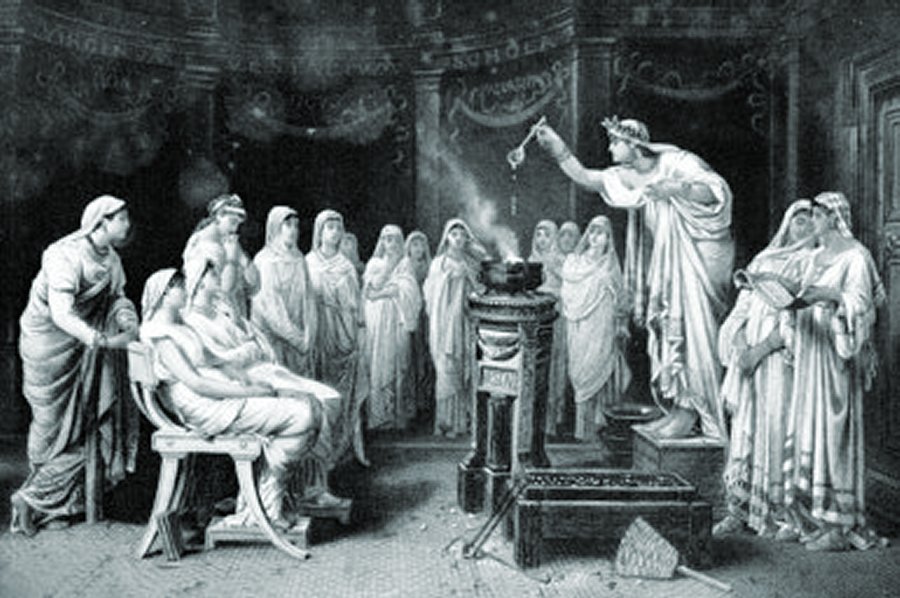Ancient Romans Loved White Teeth – All Means Were Acceptable To Get Them Even Portuguese Urine
A. Sutherland - AncientPages.com - The Romans loved their public baths but they also paid special attention to oral hygiene and had surprisingly healthy teeth.
Believed to be the strongest in the world and most effective, Portuguese urine was shipped in large quantities from Portugal for wealthy Roman ladies to use on their teeth, and the product was so popular that the Roman emperor Nero had to place a tax on it. Image via Bust
Aulus Cornelius Celsus (c. 25 BC – c. 50 AD) was a Roman encyclopaedist, historian of medicine and one of the most important contributors to medicine and scientific thought during the Roman Empire, was particularly well-known for his extant medical work, De Medicina.
Celsus stated that food leftovers in teeth can cause a disease called caries dentium, or simply caries.
“Even though fulsome white smiles were keenly prized in Roman high society, the rich were not about to forego their lavish dinners; they literally wanted to have their cake and eat it…” wrote Greg Jenner in his book “A Million Years in a Day: A Curious History of Daily Life”.
The ancient Romans knew about it and therefore, daily tooth brushing was their daily routine.
A Slave Helped A Roman Aristocrat With Tooth Brushing
However, a Roman aristocrat did not make his daily tooth brushing by himself. Instead he was helped by his own slave at home. In order to avoid the need for dentures, his slave would wield the soft twig, onto which polishing powders were applied, and then he would gently scrub his master’s teeth and gums to clean away food leftovers.
Traditional miswak sticks. (Photo: Middayexpress/WikiCommons CC BY-SA 3.0
In more serious cases, Celsus recommended filling the hole with lead (in Latin: lead means plombus), but the Romans did not like the treatment of cavities and it was the last option, particularly because of pain.
How Did The Oral Care Of The Average Roman Look Like?
"Refreshing" rinses were also used to promote oral hygiene. The composition of these substances, however, may seem somewhat unusual from our modern point of view. They also used several mixtures of ingredients similar to our modern kinds of toothpaste. However, sometimes, these mixtures – especially those proposed by Pliny the Elder – seemed creepy and disgusting. ¨
He advised to prepare good “toothpaste” that included “ashes head of hare and donkey teeth, mixed with extracts of mouse brain or hare”.
Celsus, Aulus Cornelius and De medicina libri VIII (daten.digitale-sammlungen.de
In fact, the use of the mouse brain was rather frequently used in ancient Rome. To get flavoring effect, it was mixed with bicarbonate sodium, powdered charcoal and bark. Other ingredients commonly used included a powder of ox hooves' ashes and burnt eggshells that was mixed with pumice.
The ancient Romans also had the habit to brush their teeth with … the urine. They made mixtures of goat milk and old urine to try to keep their teeth white.
Messalina, the wife of Emperor Claudius, for example, washed her teeth with a paste of powdered deer antler or “chose to gargle undiluted human urine, preferably the super-strength stuff shipped in all the way from Portugal where piss was believed to contain more ammonia…” G. Jenner writes.
The ancient Roman treatments of teeth were rather controversial at least but these were means they had if they wished to have white teeth. They efficiently removed the stone from their teeth but… they also removed the enamel, which certainly wasn’t easily restored.
Still, the Romans liked white teeth very much and neglected teeth were not welcome in Rome.
Written by – A. Sutherland AncientPages.com Staff Writer
Copyright © AncientPages.com All rights reserved. This material may not be published, broadcast, rewritten or redistributed in whole or part without the express written permission of AncientPages.com
Expand for referencesReferences:
Jenner G. A Million Years in a Day: A Curious History of Daily Life”
More From Ancient Pages
-
 Strange Tale Of Demonic Possession And Exorcism In 17th-Century New France – What Happened?
Featured Stories | Oct 21, 2022
Strange Tale Of Demonic Possession And Exorcism In 17th-Century New France – What Happened?
Featured Stories | Oct 21, 2022 -
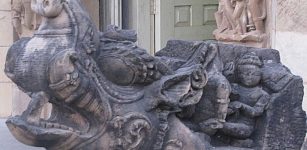 Makara – Legendary Sea-Creature With Many Incarnations In Hindu Mythology
Ancient Symbols | Feb 2, 2020
Makara – Legendary Sea-Creature With Many Incarnations In Hindu Mythology
Ancient Symbols | Feb 2, 2020 -
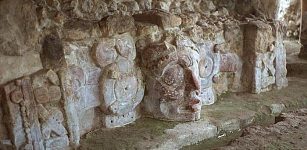 Edzna: Ancient Maya City With Sophisticated Underground System Of Canals To Control Unpredictable Floods
Featured Stories | Jun 2, 2021
Edzna: Ancient Maya City With Sophisticated Underground System Of Canals To Control Unpredictable Floods
Featured Stories | Jun 2, 2021 -
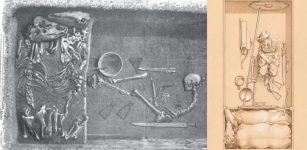 Birka Warrior Was A Woman – DNA Reveals
Archaeology | Feb 15, 2018
Birka Warrior Was A Woman – DNA Reveals
Archaeology | Feb 15, 2018 -
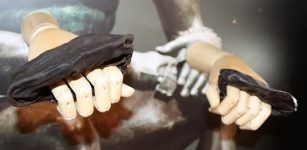 Unique Ancient Roman Boxing Gloves Discovered Near Hadrian’s Wall – The Only Surviving Example From 120 A.D.
Archaeology | Feb 20, 2018
Unique Ancient Roman Boxing Gloves Discovered Near Hadrian’s Wall – The Only Surviving Example From 120 A.D.
Archaeology | Feb 20, 2018 -
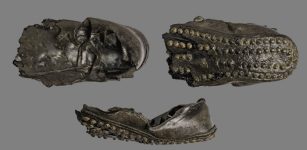 1,700-Year-Old Roman Shoes And An Exceptional Glass Workshop Unearthed In France
Archaeology | Jun 5, 2023
1,700-Year-Old Roman Shoes And An Exceptional Glass Workshop Unearthed In France
Archaeology | Jun 5, 2023 -
 Vikramashila: India’s Main Intellectual And Learning Center Of Tantric Buddhism
News | Sep 19, 2015
Vikramashila: India’s Main Intellectual And Learning Center Of Tantric Buddhism
News | Sep 19, 2015 -
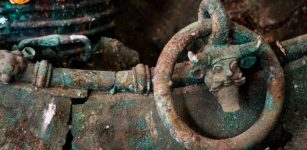 Mystery Of The Lavau Celtic Prince And The Beautiful Ancient Artifacts Hidden In His 2,500-Year-Old Tomb
Archaeology | Jun 5, 2017
Mystery Of The Lavau Celtic Prince And The Beautiful Ancient Artifacts Hidden In His 2,500-Year-Old Tomb
Archaeology | Jun 5, 2017 -
 Ask And Embla: First Human Pair Created By Powerful God Odin And His Two Brothers
Featured Stories | Sep 24, 2016
Ask And Embla: First Human Pair Created By Powerful God Odin And His Two Brothers
Featured Stories | Sep 24, 2016 -
 Ancient Cranial Modification In Peru Led To Social Inequality
Archaeology | Jan 24, 2018
Ancient Cranial Modification In Peru Led To Social Inequality
Archaeology | Jan 24, 2018 -
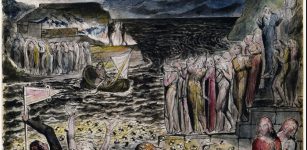 Tartarus – The Land Of The Dead – Mysterious Underground World
Featured Stories | Sep 13, 2015
Tartarus – The Land Of The Dead – Mysterious Underground World
Featured Stories | Sep 13, 2015 -
 A 5,000-Year-Old Anatolian Sword Identified In Armenian Monastery In Venice
Artifacts | Feb 28, 2020
A 5,000-Year-Old Anatolian Sword Identified In Armenian Monastery In Venice
Artifacts | Feb 28, 2020 -
 Greek God Asclepius And Ancient Healing Center ‘Asclepion Of Pergamum’
Civilizations | Nov 29, 2014
Greek God Asclepius And Ancient Healing Center ‘Asclepion Of Pergamum’
Civilizations | Nov 29, 2014 -
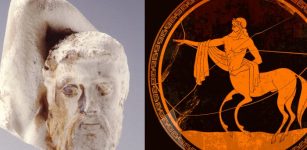 Why Is This Centaur Head A Scientific Mystery?
Archaeology | Jan 19, 2024
Why Is This Centaur Head A Scientific Mystery?
Archaeology | Jan 19, 2024 -
 Etruscan City Of Cerveteri With Magnificent House-Like Tombs Decorated With Scenes From Life And Death
Featured Stories | May 17, 2022
Etruscan City Of Cerveteri With Magnificent House-Like Tombs Decorated With Scenes From Life And Death
Featured Stories | May 17, 2022 -
 Gold Treasures From The Land Of Ancient Colchian Culture In Georgia
Featured Stories | Apr 9, 2025
Gold Treasures From The Land Of Ancient Colchian Culture In Georgia
Featured Stories | Apr 9, 2025 -
 On This Day In History: Peter The Great Defeats Charles XII Of Sweden At The Battle Of Poltava – On June 28, 1709
News | Jun 28, 2016
On This Day In History: Peter The Great Defeats Charles XII Of Sweden At The Battle Of Poltava – On June 28, 1709
News | Jun 28, 2016 -
 Evolution Of Paleodiet At Neolithic Qujialing Site Unveiled By Scientists
Archaeology | Nov 30, 2022
Evolution Of Paleodiet At Neolithic Qujialing Site Unveiled By Scientists
Archaeology | Nov 30, 2022 -
 Ancient DNA Reveals A 50,000-Year-Old Secret And Re-Writes History Of Australia
Archaeology | Mar 8, 2017
Ancient DNA Reveals A 50,000-Year-Old Secret And Re-Writes History Of Australia
Archaeology | Mar 8, 2017 -
 Invisible Ink On Antique Nile Papyrus From The Island Of Elephantine – Revealed
Archaeology | Aug 21, 2019
Invisible Ink On Antique Nile Papyrus From The Island Of Elephantine – Revealed
Archaeology | Aug 21, 2019

